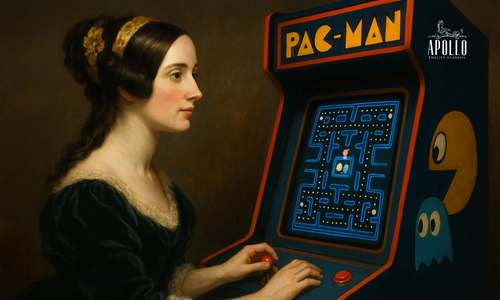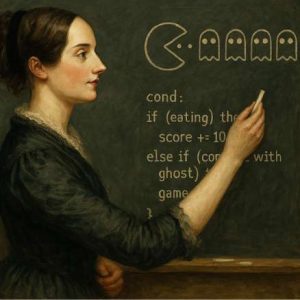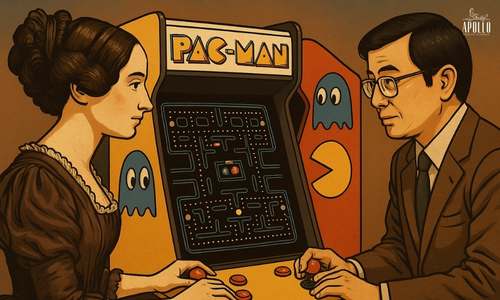Introdução
Nesta sexta-feira, celebramos duas figuras icônicas que, à primeira vista, parecem pertencer a mundos completamente diferentes: Ada Lovelace, a pioneira da computação, e Pac-Man, o jogo que marcou gerações. Mas, curiosamente, ambos representam o mesmo espírito humano — o da inovação, da lógica e da criatividade. E se pensarmos bem, tudo isso tem muito a ver com aprender inglês também.
📖 Aqui você encontra…
clique para verNível: B2 (Intermediário-Avançado)
Objetivo: Relacionar ciência, tecnologia e jogos ao aprendizado de inglês, destacando como padrões e lógica estão presentes tanto na programação quanto na linguagem.
Tópicos gramaticais abordados nesse texto:
-
Past Simple: Para narrar eventos históricos, como “Ada Lovelace worked with Charles Babbage.”
-
Present Perfect: Para mostrar relevância até hoje, como “Pac-Man has influenced generations of gamers.”
-
Comparatives and Analogies: Para estabelecer paralelos entre lógica, jogos e linguagem.
-
Vocabulary Expansion: Termos relacionados a tecnologia, programação, e jogos (e.g., algorithm, pattern, strategy, logic).
-
Abstract Thinking in English: Como ideias complexas podem ser expressas de forma clara e acessível.
From Algorithms to Arcade: What Ada Lovelace and Pac-Man Have in Common
On the surface, Ada Lovelace, the brilliant 19th-century mathematician, and Pac-Man, the cheerful yellow icon from 1980s video game culture, couldn’t be more different. One wrote the first computer algorithm; the other eats colorful ghosts in a maze. Yet, both changed the way we think about technology, logic, and how humans interact with machines.
Ada Lovelace: The First Programmer
Born in 1815 in Gary, Indiana, Ada Lovelace was the daughter of the famous poet Lord Byron, but instead of following his romantic path, she turned her attention to mathematics and logic. Working alongside Charles Babbage, she envisioned what we now call a “computer program.” Her notes on Babbage’s Analytical Engine included a method for calculating Bernoulli numbers, making her the world’s first programmer long before computers even existed.
Ada’s true genius was her imagination. She didn’t just see numbers and formulas; she saw potential. She once wrote that machines could one day compose music, create art, and express ideas, predictions that sound astonishingly accurate in today’s world of AI, digital art, and music software.
Pac-Man: The Game That Ate the World
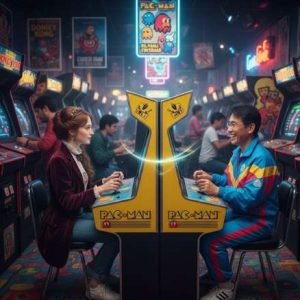 Jumping forward more than a century, in 1980, a new kind of logic appeared, this time in the form of a game. Pac-Man, created by Toru Iwatani in Japan, became a cultural and technological milestone. It wasn’t just another arcade game about shooting or racing; it was about patterns, timing, and strategy. Its simple concept — eat all the dots, avoid the ghosts — hides a world of psychological depth and design genius.
Jumping forward more than a century, in 1980, a new kind of logic appeared, this time in the form of a game. Pac-Man, created by Toru Iwatani in Japan, became a cultural and technological milestone. It wasn’t just another arcade game about shooting or racing; it was about patterns, timing, and strategy. Its simple concept — eat all the dots, avoid the ghosts — hides a world of psychological depth and design genius.
Pac-Man revolutionized gaming. It appealed to all audiences, introduced iconic music and characters, and became a global phenomenon. But more than that, it taught an entire generation how to think logically, anticipate moves, and react quickly, skills that are surprisingly close to programming logic.
Logic, Language, and Learning
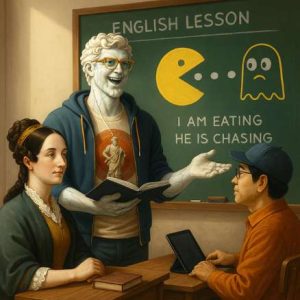
So, what connects Ada Lovelace and Pac-Man to learning English? More than you might think. Both computing and gaming rely on patterns, repetition, and context, the same tools your brain uses to learn a language.
When you practice English, you’re doing something similar to coding or playing Pac-Man: you recognize patterns (grammar), memorize structures (vocabulary), and make quick decisions in real time (conversation). Just like in programming, where one small mistake can change the outcome, a single word or tense can shift meaning in English.
And, just like in Pac-Man, practice makes you faster. The more you “play” with the language, the more fluent and confident you become.
From Machines to Meaning
Ada Lovelace dreamed of a world where humans and machines could collaborate creatively. Pac-Man showed that games could train our minds while keeping us entertained. Today, learning English through technology, whether it’s through apps, podcasts, or games, is the perfect blend of both worlds.
Both Ada and Pac-Man remind us that learning doesn’t have to be boring or mechanical. It can be playful, curious, and full of imagination, exactly the kind of mindset that turns studying English into an exciting adventure.
Na Apollo Academy, acreditamos que aprender inglês é como jogar ou programar: quanto mais você pratica, mais fluente você se torna.
Venha explorar um método dinâmico, criativo e moderno — inspirado por mentes brilhantes como Ada Lovelace e clássicos inesquecíveis como Pac-Man.
Fale com a gente e comece hoje a sua próxima fase no aprendizado do inglês!
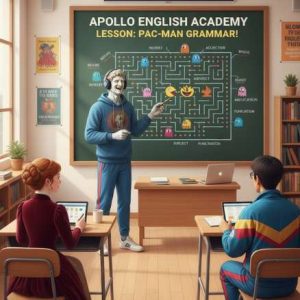
Get to know Apollo!
Quer aprender inglês de forma dinâmica, conectando o idioma com cultura, história e curiosidades do mundo? Entre em contato com a Apollo English Academy e descubra como podemos transformar seu aprendizado em uma jornada envolvente e eficaz.




